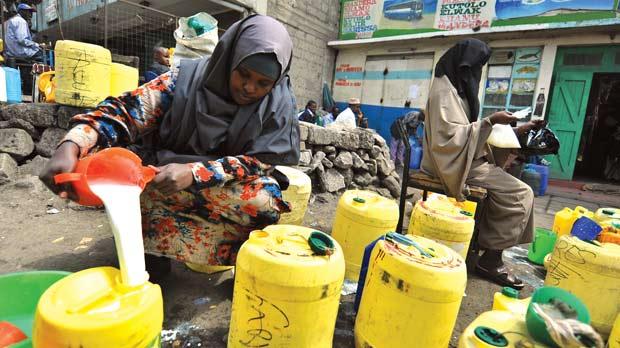”We sell an average of 100 litres of milk to consumers in Isiolo town every day,” said Ms Mohammed.
Sulekha Mohammed said the group started in 2013 and they benefited from training on hygiene and business management at the Naivasha Dairy Training Institute under a project funded through Swedish International Development Agency (Sida) and National Agriculture and Livestock Extension Policy (Nalep). ”Apart from the training, we also got donation of milk gallons of 500 kg and six fridges,” she said.
The group, three years into the business, has managed to buy a plot and construct a commercial building.
”We operate from here and occupy two of the main front shops. We have rented the others,” said Mohammed.
Group members also own camels where it currently stands at 89 while they help each through merry-go round of Sh 25,000 for each member. ”We use the money from merry-go round to meet our basic family needs,” said Mohammed.
The group has also ventured into selling camel meat called locally ‘nyirinyiri’ (meat cut into tiny pieces and deep-fried).
”Nyirinyiri is a Somali delicacy that is in high demand and if well-preserved can stay for up to a month,” stated the official.
They send the prepared meat in metal containers to Nairobi twice a week where a kilogram fetches 1,200. They take 160 kg per week. A kilogram of raw meat is sold in butcheries at Sh 400 in Isiolo town.
The women buy the meat from local butcheries and prepare the meal themselves. ”We get orders, some for weddings from Nairobi and even Tanzania,” she said.
The all-Muslim group does not take loans from banks as their faith forbids business charging interests and they started their business through personal and family contribution. Recently they developed a business proposal that they sent to USAid funded Resilience and Economic Growth in the Arid Lands—Accelerated Growth (Regal-AG) on camel meat value addition product (nyirinyiri).
According to Regal-AG fact sheet on business development grants for this financial year, Tawakal’s proposal is among five from Isiolo and Marsabit that are at initial negotiation stages. If it goes through, they stand to benefit from a grant of Sh 2.5 million.
According to a study commissioned by SNV, a Dutch NGO, estimated 340m litres of camel milk was produced commercially in 2007, valued at more than Sh 8billion at the farm level. This makes the sub-sector larger than cotton and comparable with coffee.
At the international level, the FAO estimates that camel milk trading could be worth $10bn if key improvements are made and proper marketing is done. With this in mind, the Kenyan government is making a strong effort to strengthen the sub-sector and link pastoralists to wider markets.
“We are in the process of building a mini dairy processing centre in Garissa. We are also encouraging camel ownership in the communities where camel keeping is not common but the dry land and climate are suitable for camel rearing,” says Julius Karuse, executive director at the ministry of livestock development.








